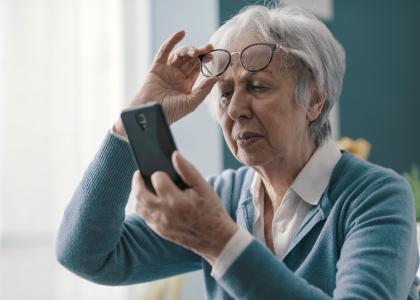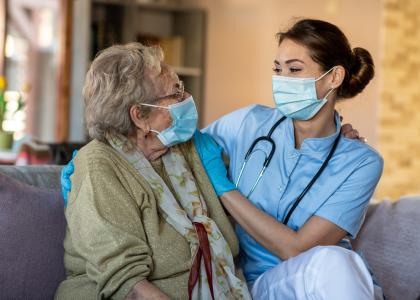Interventional
Digital Technology to Support Adherence to Hypertension Medications for Older Adults with Mild Cognitive Impairment

Mild cognitive impairment (MCI) is characterized by mild impairment in one or more cognitive functions and is associated with an increased risk for failure to take prescribed medications. Hypertension is prevalent among persons with MCI (PwMCI) and nonadherence to medications increases the risk of accelerated cognitive decline through cerebrovascular disease. Adherence is often only 46% or lower among PwMCI.
Transcending COVID-19 Barriers to Pain Care in Rural America: Pragmatic Comparative Effectiveness Trial of Evidence-Based, On-Demand, Digital Behavioral Treatments For Chronic Pain

For people from the rural America with chronic diseases, the pandemic can not only worsen pain, but also it can trigger anxiety, depression, trouble sleeping, and substance use. One way doctors and health systems are reaching out is by video visits, where patients and their providers communicate online via the Internet.
Reducing Stigma Among Healthcare Providers to Improve Mental Health Services (RESHAPE)

Our preliminary work suggests that reducing primary care workers' stigma against persons with mental illness may improve accurate detection of mental illness. We developed a version of mhGAP training that includes a stigma reduction component: “Reducing Stigma among Healthcare Providers” (RESHAPE).
Southwest Health Equity Research Collaborative

The overarching goals of the project are to (1) document impacts of relaxed restrictions for telemedicine and mHealth; and (2) assess implementation of MAT “take-homes” for people in substance use disorder treatment in rural, underserved, and minority communities in Arizona in the wake of COVID-19.
Determining Optimal Treatment Intensity for Children with Language Impairment (LI)

This project will determine the optimal treatment intensity for children with language impairment (LI), provided via telepractice platforms, and will investigate the moderating influence of the home environment on children’s outcomes.
Supplement: Long-term Effects of the Family Check-Up on Depression and Suicide Across Trials and Development

The project will adapt and test the efficacy of the Family Check-Up Online as a treatment to foster resilient family functioning in response to the COVID-19 pandemic.
Addressing Emotional Wellness Among COVID-19 Informal First-Responders: REJOICE-P

Given the specific need of pastors serving as informal first responders, this supplement seeks to refine the existing REJOICE intervention to provide pastors with skills to improve personal emotional wellness related to serving on the first-lines of the COVID-19 pandemic and build the capacity of pastors to adequately respond to the emotional needs of rural African Americans.
Improving the Collaborative Health of Minority COVID-19 Survivor & Carepartner Dyads Through Interventions Targeting Social and Structural Health Inequities

This study tests the efficacy of a telehealth-enhanced, RN-Community Health Worker delivered dyad intervention, ICINGS FAM, on quality of life, and health-related outcomes in vulnerable African American adults with pre-existing chronic illness and their informal care partners.
A Technological Intervention to Improve Nutrition among Older Adult Congregate Meal Participants during COVID-19

This project extends existing congregate meal programming infrastructure and partnerships with Older Adults Technology Services (OATS) to provide a sustainable approach focused on older adult health.
StepWell: Stepped Care Mental Health and Substance Use Telehealth Services for COVID-19 Affected Patients

To meet the critical mental health challenges presented by the COVID-19 pandemic, this research will adapt and apply the Electronic Mental Wellness Tool (EmwT) that guides providers in screening patients for any mental health and substance use disorders (MHSUDs) and triaging patients to specific evidence-based treatments according to diagnostic categories.